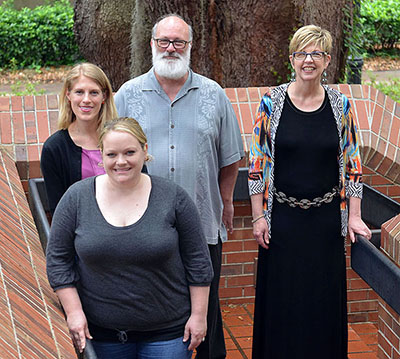College gives research team ‘incentive’ to create better reading assessment tool
Corinne Huggins-Manley says it was a “total team effort” that led to her receiving a College of Education-funded grant to continue promising research aimed at developing an effective reading assessment tool that teachers can use to help students improve their reading ability.

CRIF research grant team members Corinne Huggins-Manley (front), Amber Benedict (from left), David Miller and Mary Brownell.
She said researchers also could use the tool to advance reading theories and assist in measuring effects of teacher professional development
Huggins-Manley, an assistant professor of research and evaluation methodology, said the $39,900 awarded to her and three colleagues – David Miller (REM), Mary Brownell (special education) and Amber Benedict (special education) – through the COE’s College Research Incentive Fund (CRIF) will be used to pay for additional help from graduate students, participant incentives and honorariums for multiple field experts.
“CRIF is such a great program,” Huggins-Manley said. “The funds allow, in part, for some relief from teaching in order to dedicate the necessary time and effort to this research project.”
The annual award is based on the team’s proposal, “Development of a Diagnostic Assessment of Morphological Awareness,” which itself could morph into a software program that would take current reading proficiency tests that estimate overall reading levels to a diagnostic level by measuring which of five skills – derivation, decomposition and prefix, inflected ending and root comprehension – individual students possess.
“Our goal is to take the reading-level data that is used now and transform that into something more specific, more skills-focused,” Huggins-Manley said. “It’s an assist tool that will provide teachers with additional information about their students’ reading skills and researchers with the ability to study skill-level reading constructs.
“Our research has the potential to make a profound impact in the classroom,” she added. “Teachers will have the skill-level information they need to plan teaching strategies for individuals or groups of students. They’ll be able to implement empirically-driven approaches that can help them both address students’ needs and accentuate students’ strengths.
“It’s a total team effort all the way.”
Contacts
Source: Corinne Huggins-Manley, assistant professor of research and evaluation methodology; amanley@coe.ufl.edu; phone 352-273-4342
Writer: Stephen Kindland, College of Education Office of News and Communications; skindland@coe.ufl.edu; phone 352-273-3449.




